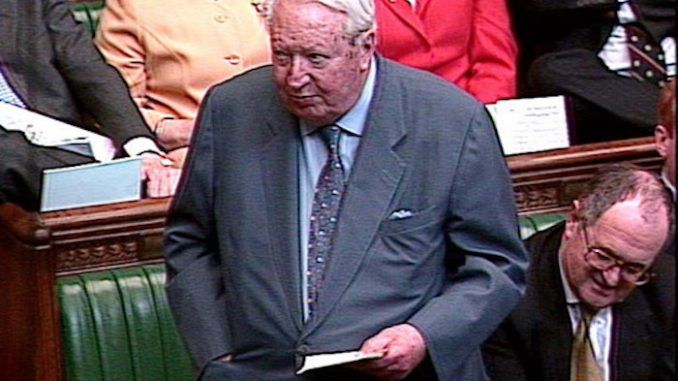
A police report released on Thursday reveals that former British prime minister Sir Edward Heath brutally raped an 11-year-old boy and murdered hundreds of others.
According to Wiltshire police chief constable Mike Veale, the findings represent a “watershed moment” in exposing elite pedophile rings operating within the British establishment.
Smh.com.au reports: He added, however, that police had reached no conclusion as to the guilt of Sir Edward, who died in 2005, and it would be inappropriate to do so.

BYPASS THE CENSORS
Sign up to get unfiltered news delivered straight to your inbox.
You can unsubscribe any time. By subscribing you agree to our Terms of Use
Wiltshire police have spent the past two years reviewing allegations of crimes by Sir Edward against 40 people, including two while he was prime minister.
The allegations included child sexual abuse and rape and indecent assault, physical abuse and sexual abuse against an adult.
Each allegation was investigated, and in 24 cases the police took a direct statement from the alleged victim.
In their concluding report, released on Thursday, they said that in relation to seven of the alleged victims, the evidence they gathered would have warranted Sir Edward’s interview under caution.
The alleged offences against those victims were:
- In 1961, allegedly raping and indecently assaulting an 11-year-old boy during a “paid sexual encounter in private”.
- In 1962, indecently assaulting a 10-year-old boy during a “chance encounter in a public place” in the company of another adult male.
- Around 1964, indecently assaulting a 15-year-old boy during three paid sexual encounters.
- In 1967, indecently assaulting a 15-year-old male in private “during a chance encounter in a public building”.
- In 1976, indecently assaulting, over clothing, an adult male at a public event.
- Around 1992, indecently assaulting an adult male after consent was withdrawn in a paid sexual encounter in a hotel.
- Around 1991, indecently assaulting a male aged between 12 and 14 during a “chance encounter in private gardens”.
These alleged attacks all took place while Sir Edward was a member of parliament, but none related to the time he was prime minister. Police added that in the case of the last alleged victim, their investigation gathered information that potentially undermined the account.
Paul Mills, the police commander for the investigation, dubbed Operation Conifer, said Sir Edward would have been interviewed “to obtain his account in relation to the allegations made against him”.
“It is clearly inappropriate to speculate what his response would have been… and no inference of guilt should be drawn by the decision to interview him.”
He said that police had made no conclusions as to Sir Edward’s guilt or otherwise, not least because he did not have the opportunity to respond to the allegations against him.
He conceded that due to the passage of time many investigative opportunities were not available, as memories had deteriorated and potentially relevant documents lost.
Police interviewed Sir Edward’s personal police protection officers, his drivers and staff – and also reviewed his private papers held at the Bodleian Library.
The investigation began in August 2015, after the police complaints commission announced it was investigating how Wiltshire Police had dealt with a court case relating to Edward Heath in 1994.
At the time four other police forces were also in the early stages of investigating allegations of child sexual abuse against the former PM.
Wiltshire police chief constable Mike Veale said there were “compelling and obvious” reasons to investigate the allegations about Sir Edward Heath.
“(He) was an extremely prominent, influential and high-profile person, arguably one of the most powerful people in the world,” he said.
Mr Veale believes the investigation “signals a watershed moment for people and victims who have suggested or implied there has been a state cover-up for some senior figures who may have been involved in child sexual abuse”.
During the two-year investigation there were allegations of crimes by Sir Edward against 40 people, made either directly by the victim, anonymously or by a third party.
“The allegations against him were of the utmost seriousness and from a significant number of people,” Mr Veale said.
“It would be an indefensible dereliction of my public duty … not to have investigated such serious allegations against a former prime minister even though he was deceased.”
The report did not apportion guilt, suggest or conclude guilt, and no such conclusion should be drawn. Presumption of innocence was enshrined in the law, Mr Veale said.
He recommended against asking a retired judge to assess the evidence and pronounce a verdict.
“This would neither provide value or money or indeed a legitimate outcome of the guilt or innocence of Sir Edward Heath,” he said.
The police reports, however, will be considered by the UK’s Independent Inquiry into Child Sexual Abuse.
Mr Veale anticipated criticism of the decision to investigate allegations about a dead person, and said others would have criticised the cost (£1.5 million, $A2.5 milion) and others “would always defend the conduct of others”.
But the decision to investigate had been “the right moral thing, ethical thing and professional thing to do”, he said.
He said the investigation had been conducted objectively, with respect and without fear or favour. It had gone “where the evidence took us”.
He said the police had the duty to protect and safeguard children and vulnerable adults.
“My team has not deviated from this legal and professional responsibility,” Mr Veale said.
An independent scrutiny panel said the investigation was “fair, sensitive and rigorous with regard to both victims and suspects”.
But they added “there is an unavoidable gap in the evidence with regard to Sir Edward Heath”.

